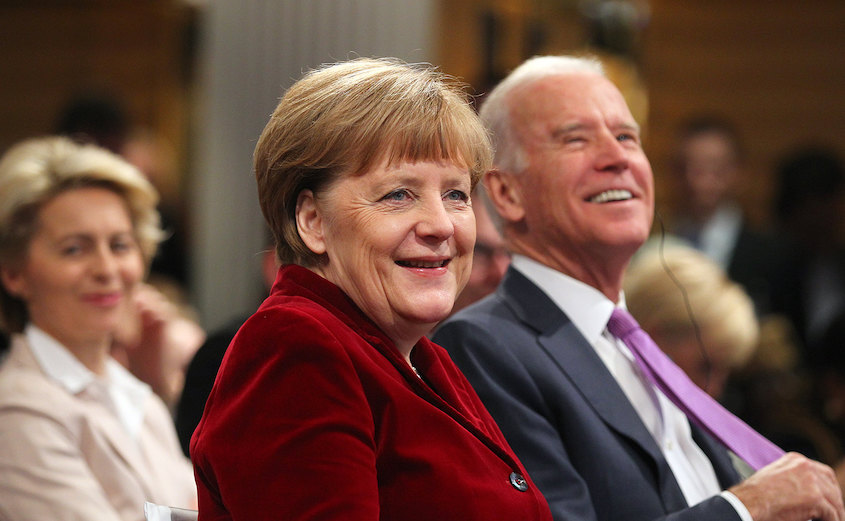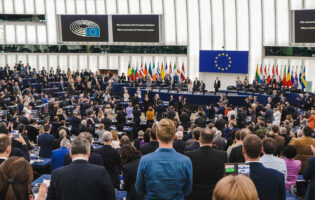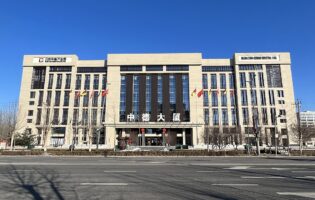
Munich Security Conference via Flickr
After Merkel’s Steady Hand, A More European and Strategically-Minded Germany?

Peter S. Rashish
Vice President; Director, Geoeconomics Program
Peter S. Rashish, who counts over 30 years of experience counseling corporations, think tanks, foundations, and international organizations on transatlantic trade and economic strategy, is Vice President and Director of the Geoeconomics Program at AICGS. He also writes The Wider Atlantic blog.
Mr. Rashish has served as Vice President for Europe and Eurasia at the U.S. Chamber of Commerce, where he spearheaded the Chamber’s advocacy ahead of the launch of the Transatlantic Trade and Investment Partnership. Previously, Mr. Rashish was a Senior Advisor for Europe at McLarty Associates, Executive Vice President of the European Institute, and a staff member and consultant at the International Energy Agency, the World Bank, UNCTAD, the Atlantic Council, the Bertelsmann Foundation, and the German Marshall Fund.
Mr. Rashish has testified before the House Financial Services Subcommittee on International Monetary Policy and Trade and the House Foreign Affairs Subcommittee on Europe and Eurasia and has advised three U.S. presidential campaigns. He has been a featured speaker at the Munich Security Conference, the Aspen Ideas Festival, and the Salzburg Global Seminar and is a member of the Board of Directors of the Jean Monnet Institute in Paris and a Senior Advisor to the European Policy Centre in Brussels. His commentaries have been published in The New York Times, the Financial Times, The Wall Street Journal, Foreign Policy, and The National Interest, and he has appeared on PBS, CNBC, CNN, and NPR.
He earned a BA from Harvard College and an MPhil in international relations from Oxford University. He speaks French, German, Italian, and Spanish.
On July 15, German Chancellor Angela Merkel will meet with President Joe Biden in the White House, the first European leader to visit him since he took office in January. Merkel has been a steady hand on the tiller these past 16 years, a period that has included at least three major shocks to the international economic system: the global financial crisis in 2008-09; Donald Trump’s presidency in the United States; and the twin public health and economic crisis that is COVID-19.
Merkel has improved with time. Her approach to the euro’s troubles following Wall Street’s collapse in the 2000s was short-sighted, with its prescription of premature austerity and asymmetric adjustment. It revealed that German policymaking had not fully adjusted to being part of a single-currency zone.
During four erratic years with Trump in the White House, Merkel found a way to navigate between the extremes of a pragmatic embrace of the U.S. president on the one hand and ending up a lone liberal voice in the wilderness on the other. Merkel took advantage of the German presidency of the G20 in 2017 to affirm the value of a rules-based trading system in the face of Trump’s onslaught against an economic order the United States and its allies had patiently built over 70 years.
Perhaps learning from the mistakes of the euro crisis, COVID-19 led Merkel to restart the traditional Franco-German motor of European integration in the form of last year’s historic NextGen EU recovery plan. For the first time, the European Commission was empowered to borrow a considerable sum (€750 billion) on the capital markets to finance a greener and more digital post-pandemic economic future for the EU. While Merkel’s government claimed this was a one-off phenomenon in response to exceptional circumstances, a taboo has been broken.
Even in the later years of Merkel’s leadership, there were missteps. While she showed a remarkable ability to innovate and to escape traditional policy frames in her response to the pandemic, the same cannot be said for her approach to what could be called the “global economic balance of power”—a phrase that Merkel would almost certainly resist using herself.
Perhaps because the post-Cold War world finally offered Germany the chance to thrive as a civilian and commercial power, putting years of war and division behind it, it is taking the country longer than some others to adjust to the reality of China’s challenge to transatlantic interests and liberal values more broadly. Merkel has been reluctant to accept that to “make the world safe for diversity,” as John F. Kennedy put it during a different period of great power tensions, will require Berlin to think more like a strategic actor.
The Chancellor’s push to sign the Comprehensive Agreement on Investment (CAI) between the EU and China before the end of the German presidency of the EU in December 2020—thereby depriving the EU of the opportunity to coordinate China policy with the new U.S. administration—is a case in point. It seemed to crystallize the inclination to lean into economic engagement for as long as possible to deal with the effects of China’s state-capitalism. As a result of some heavy-handed countersanctions from Beijing against EU officials, the CAI is now on ice, and is looking more and more like the document from a previous era that it is (EU-China investment talks began in 2014).
Whatever the constellation of the next German government, it will be able to count on deep civil-society, commercial, and security ties with the United States as a foundation for enduring partnership. Those bonds will only deepen if Chancellor Merkel’s successor can strengthen Germany’s role within the EU and strike a better balance between economic and strategic considerations in its global engagement.









